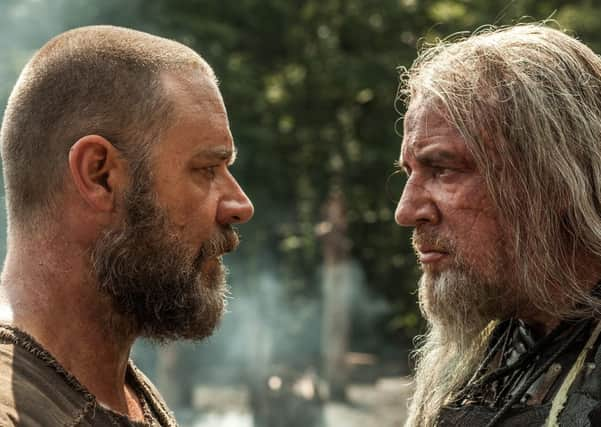Film review: Noah (12A)


NOAH (12A)
Directed by: Darren Aronofsky
Starring: Russell Crowe, Jennifer Connelly, Anthony Hopkins, Emma Watson, Logan Lerman, Ray Winstone
Star rating: * * * *
GIVEN how open to interpretation the source material is, big budget biblical epics have had a bizarre tendency in the past to play things pompously straight – as if somehow their scripts were based upon some indubitable historical record, any deviation from which might incur the wrath of a vengeful higher power, ready to dispense face-melting beams of light, like that bit at the end of Raiders of the Lost Ark.
Advertisement
Hide AdWith Noah, however, Darren Aronofsky exploits the crazier aspects of the Old Testament as much as he takes them seriously, transforming this sketchy story of a 500-and-something-year-old obsessive into both an epic, myth-filled spectacle and a disturbing psychodrama horror flick, one not a million miles away from previous Aronofsky films about madness such as Pi and Black Swan.
That’s a good thing, not least because Aronofsky’s previous stab at epic filmmaking was The Fountain, a gooey slice of New Age hokum. Noah, though, shows he’s just as capable of working on a grand scale as he is on a smaller one: this is a film, after all, full of blood-soaked battle sequences, Tolkien-esque stone giants, raging tempests and, in one of the film’s most thrillingly audacious moves, an extended montage depicting the origins of the universe in which the opening words of Genesis are accompanied by time-lapse photography showing the Big Bang and evolution at work.
There’s also, of course, that massive animal-filled ark, which eschews the aesthetically pleasing designs of Sunday School picture books in favour of a rough-hewn, purpose-built, proto shipping container, one better able to cope with the stampede of wildlife bustling to get in as the apocalypse draws ever closer. (There’s no room for anthropomorphic, two-by-two civility in this saga, although Noah does have some magical incense that puts the animals to sleep once on board, thus preventing them from eating one another).
At the centre of it all is Noah himself, a once-decent man driven mad by his oneiric connection to the Creator (the word “God” is never used). As played by Russell Crowe – who seemed to be doing his bit to hasten the floods with his carbon footprint-intensifying airborne dash between the film’s regional premieres in Edinburgh, Dublin and Cardiff last Saturday – Noah is no longer a figure of beardy benevolence of past interpretations of the story. He’s a tormented executor of the Creator’s desire to wipe the slate clean, someone whose own observance of mankind’s depravity has turned him into a ruthless believer that Adam and Eve may well have been a mistake.
Before we reach that crisis point, though, before Noah’s days are interrupted by hallucinatory flash-cuts of apples and snakes that resemble those brilliant pill-popping, heroin-snorting, pupil-dilating sequences from Requiem for a Dream, Aronofsky seems intent on setting the story up as some sort of barmy eco warning. Shooting the film in Iceland, he uses the country’s volcanic vistas to stunning effect to create a post-Eden Earth in which the industrialised civilisation constructed by the descendants of Cain has turned the world into a barren, blackened wasteland – like a Nordic Mad Max movie. As a descendent of Adam and Eve’s third son, Seth, Noah and his family try to live off the land, munching on berries and only picking what they need. Such purity of existence may well be why he’s been tasked with his mission (although the instructions are ambiguous at best), but his righteousness is eventually called into question by his own family, whom he informs he intends to sacrifice – like some Jonestown-esque cult leader – to help ensure the Earth’s survival.
Crowe’s great at tempering this kind of madness with his customary gravitas here; his performance certainly anchors the film in a way that allows Aronofsky to push its ridiculousness elsewhere – such as when Noah enlists the help of “the Watchers”, the aforementioned stone giants whose elaborate backstory feels like it could have been culled from a prog-rock concept album from the 1970s. There’s some entertaining hamminess, too, from Anthony Hopkins (as Noah’s grandfather Methuselah) and Ray Winstone, whose self-appointed warrior king Tubal-cain gets to utter the line, “I told you: I’m not afraid of miracles” in an amusingly guttural London growl. Emma Watson also does some decent work as Ila, the love interest for Noah’s eldest son and the source of an ethical dilemma that Aronofsky and his co-screenwriter Ari Handel use to ratchet up the are-we-worth-saving? drama driving the film.
Advertisement
Hide AdOf course there will be those that take offence at some of this and some who use it as a starting point for more considered theological discussions. Really, though, Noah is testament to the power of cinema to deliver something startling and silly and brilliant all at the same time. In a fairly risk-averse blockbuster landscape, the fact that it exists in the form that it does feels like a miracle in itself.